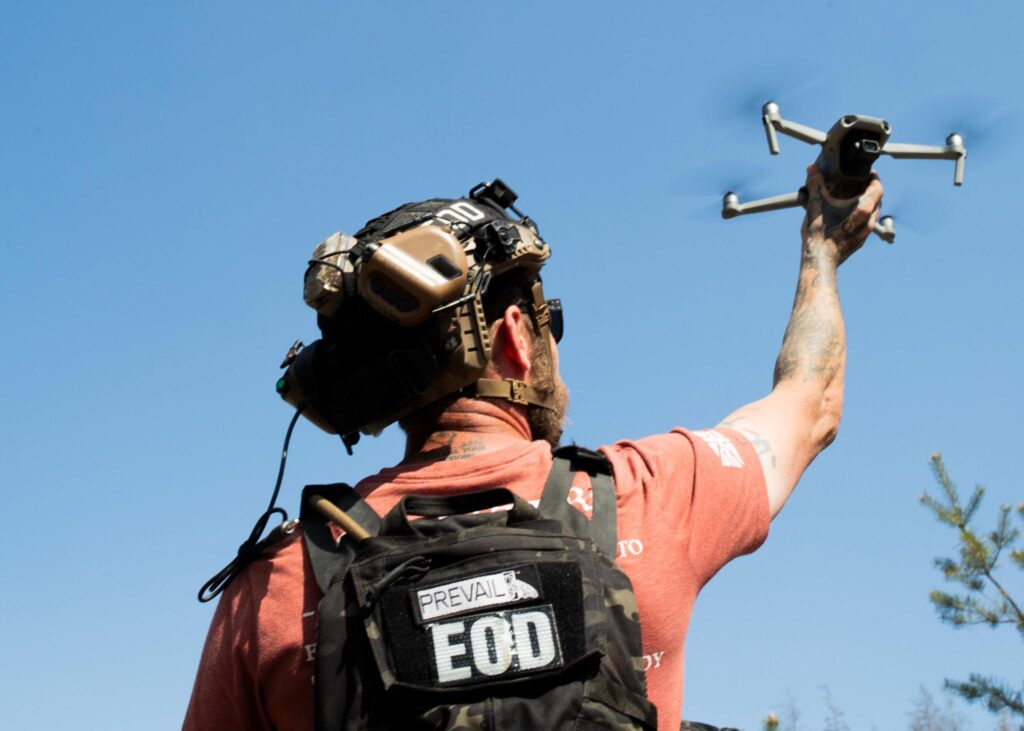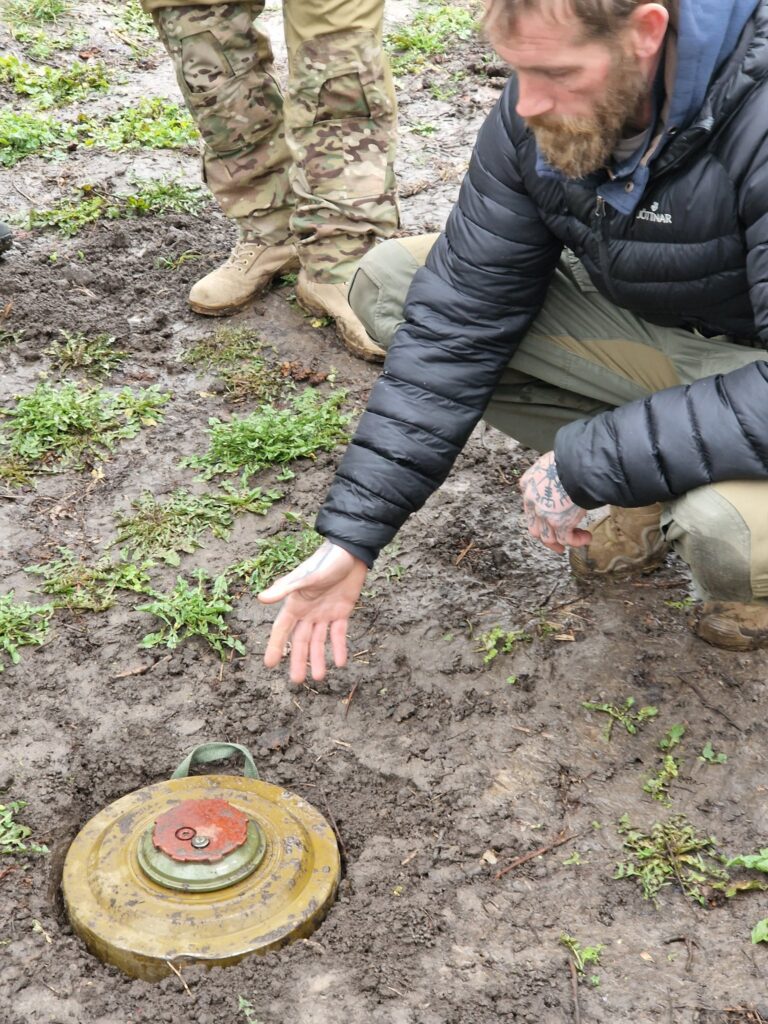With hands steady enough to disarm bombs, Chris Garrett cradled an infant daughter he would leave behind for Ukraine’s minefields.
“A British Army veteran and bomb disposal expert, Christopher “Swampy” Garrett spent years clearing landmines and unexploded ordnance across Ukraine — a quiet force on the hidden front lines Russia designed to murder Ukraine’s civilians long after its soldiers left.
“I just concentrate on my job, I just switch off from everything,” Garrett once explained. “I’m not thinking about my family, a beer, making dinner, or going to see friends. My life is a very small box in front of me.”
That box became his final focus on 6 May, when the 40-year-old was killed while dismantling a Russian explosive device in Izium, a frontline city in the east of Ukraine.
In February, Garrett shared his hopes to watch his infant daughter grow up and of possible peace talks under the Trump administration. Just five months later, Corrie Nieto, Euromaidan Press video director — and Chris’s friend — spoke with those who knew him best to honor his devotion to saving Ukrainian lives — and the outstanding man behind the mission to disarm the world’s largest minefield.
The man who saw through Russia’s lies when others looked away
“I’ve seen what happens to the civilian population when they lose legs or arms,” Chris explained in an interview with The Gaze about his decision to volunteer in Ukraine. “That became the driving force behind my mission.”
Before dedicating his life to clearing Ukraine’s war-shattered soil, the Isle of Man native served in the British Army, worked as a tree surgeon — which earned him the nickname “Swampy” — and trained in bomb disposal in Myanmar.
It was there that news of Ukraine’s 2014 Revolution of Dignity — a massive pro-democracy uprising that ousted a Russian-backed president — and Russia’s subsequent occupation of the country’s east first caught his eye, just as much of the world was looking the other way.
“Back then, there wasn’t much news coverage, and even when there was, it never mentioned Russia. It never talked about Russian aggression,” recalls James, a former bomb disposal specialist who trained under Chris. “Swampy saw through that immediately and came here.”
By August 2014, when Russia had already annexed Crimea and ignited war in Ukraine’s east, Garrett abandoned his mission in Southeast Asia and rushed to Ukraine. He immediately joined a Ukrainian National Guard unit during the first phase of Russia’s Donbas invasion, volunteering to clear mines and train troops in detecting explosives.
“When you’ve worked in areas where you had children and adults with no legs or no arms, striving to continue in existance, while still living around these things, it is a good driving force to me,” Chris told The Gaze, recalling how his time in Myanmar fueled his decision to come to Ukraine.
Later, he took on a combat role as a scout sniper, staying in Ukraine until 2017. Yet, when Russia unleashed the full-scale invasion across multiple fronts five years later, Chris rushed back — only to stumble upon realities so disturbing that it locked in his decision to stay with Ukraine until the end.

“There’s no humanity left”
In the spring of 2022, as Ukrainian forces drove Russian troops out of the Kyiv suburbs, Garrett was among the first to defuse deadly traps left behind in Bucha, Irpin, and Hostomel — once-peaceful suburbs the Kremlin turned into warzones and scenes of some of its worst atrocities. What he found in those once-peaceful neighborhoods after Russia’s retreat left no doubts: he had to stay.
“We found a Russian trench position…full of women’s clothing and children’s toys,” Garrett recalled. “This is not the ‘liberating’ army, they are not here to help anyone – their tactics are disgusting.”
Alongside more than 161,000 documented war crimes, a decade of Russian aggression has made Ukraine the most mined country in the world. Nearly a quarter of its land is contaminated — an area larger than Greece and nearly the size of New York State. At the current pace, clearing it could take up to 750 years, leaving over 10 million civilians walking a deadly tightrope every day, sometimes even inside their own homes.
“There were incidents of grenades being found in light fixtures, in washing machines — just ‘surprises’”, Swampy recalled. “These are not designed to kill combat engineers or police — these were placed there to kill civilians coming back to their homes.”
To tackle the crisis, Chris co-founded the NGO Prevail Together, leading efforts in mine clearance, medical aid, and humanitarian support across the country. The team also trained soldiers and police in mine risk awareness — saving lives long after the battles end.
“Leadership out here is the biggest part of maintaining high morale and a calm and functioning team. He proved that multiple times across the missions,” recalled his former trainee James. “The vast majority of the operations the [Foreign] Legion conducted wouldn’t have been possible without him,” James said.

To stand with Ukraine in every way that counts
Chris Garrett left behind his partner, Courtney, and their infant daughter, both residing in the US The distance weighed heavily on him — but his sense of duty was stronger. He stayed, knowing the mission was bigger than himself.
“It’s obviously not very easy because of the separation between us as a family, especially with a young baby,” he said. “But we want to do as much as we can to support Ukraine until Ukraine turns around and says, ‘Thank you, we don’t need your help anymore.'”
Triinu Perve, a longtime volunteer from Estonia who worked closely with Chris, described him as a devoted family man — always longing for the day he’d reunite with the ones he loved.
“He was a very loving family guy. He loved his fiancée, his kid a lot. He was talking all the time about them,” she told Euromaidan Press. “He was saying that he needs to do more training and finish going on the field, the mining, because his family needs a family man.”

That softer side extended to those who knew Chris the best. Rachel Jamison, founder of Protect a Volunteer, a fundraising platform supporting volunteers in Ukraine, highlighted the contrast between Chris’s fearless professionalism and his warmth outside the field, calling him a “complete goofball” off-duty.
“There was something about him that everybody who knew him, he was just your friend immediately,” Rachel told Euromaidan Press. “He could put anybody at ease. He was always there for everybody who ever asked.”
Michael Dumler from Task Force 31 — a Ukrainian charity that trains, advises, and equips the military — spoke to that same sense of purpose, describing Chris’s commitment as unshakable:
“There was something about him that everybody who knew him, he was just your friend immediately,” Rachel explained. “He could put anybody at ease. He was always there for everybody who ever asked.”

He adds that this sense of personal responsibility kept “him the deminer in Ukraine long after others had left and pushed him to train others who would continue the mission after him.
“Chris had a really profound sense of responsibility. Having the experience that he has and the understanding of the job that he was doing,” Michael said. “And he felt that he was the best fit to be out there doing it.”
“Thousands of Ukrainians are alive because of him”
While Ukraine’s National Police praised Chris for his lifesaving work in mine clearance, the Kremlin took notice too — but in a darker way. In 2023, a Russian-controlled puppet court in occupied Donetsk sentenced him in absentia to 14.5 years in prison, branding his demining efforts as “terrorism.”
Chris brushed it off in March, calling it “a pathetic attempt to smear” him by those who have “murdered, raped, and tortured thousands of civilians in Ukraine.” The sentence only strengthened his resolve to continue his work.

Swampy wasn’t just a bomb disposal expert or a target of Kremlin propaganda — he was also deeply committed to helping civilians rebuild their lives. Beyond the dangerous frontline work, he helped evacuate families from combat zones and worked tirelessly to secure humanitarian aid.
“I would call him not just a pillar of the volunteer community here but a titan,” Rachel told Euromaidan Press.
However, Chris Garrett’s greatest legacy lives in the hands he trained. During his time in Ukraine, he and his team prepared over 2,000 Ukrainian soldiers, police officers, and international volunteers to safely disarm mines — planting the seeds of a new generation that will carry forward the decade-long fight to make Ukraine safe again.
“I think there’s going to be thousands of Ukrainians who are alive because of him,” Rachel added.
“I’m glad to know you for the short time that I did”
What makes Chris’s loss even harder to bear is that he had just begun to shift his focus. In February, he spoke about wanting to watch his child grow up — and his hope to step back from danger.
“In the back of my mind, I’m always thinking — who put this here, and why?” Chris said, speaking about mine clearance. “Did he know what he was doing? Was he trying to kill me, or was he just following orders to place a landmine in the ground?”
Despite his caution, Chris Garrett was gravely injured alongside two others when an improvised explosive device (IED) detonated in a home in de-occupied Izium, eastern Ukraine. Fellow Prevail Together board member Shaun Piner shared the news on X — Garrett and his partner later died from their wounds.
Those who knew Chris best say he was fully aware of the risks, but he chose to stay, serve, and protect others anyway. His friend James believes Chris wouldn’t have wanted it any other way.
“I don’t think that he’d regret any of it. I think that obviously he’d be angry and he’d be upset because of what he leaves behind,” he says. “But I don’t think he’d regret a single second of it or a single decision.”
In their final reflections, those who knew Chris opened their hearts, sharing the words they wished they could say to him one last time. Michael said he wouldn’t need words at all — he’d just want to hug Chris and share a cigarette, like they used to.
“Step away from the mines,” Rachel said with a sad smile. “It was a pleasure to know you. I’m just glad I got to know you for the short time that I did.”




